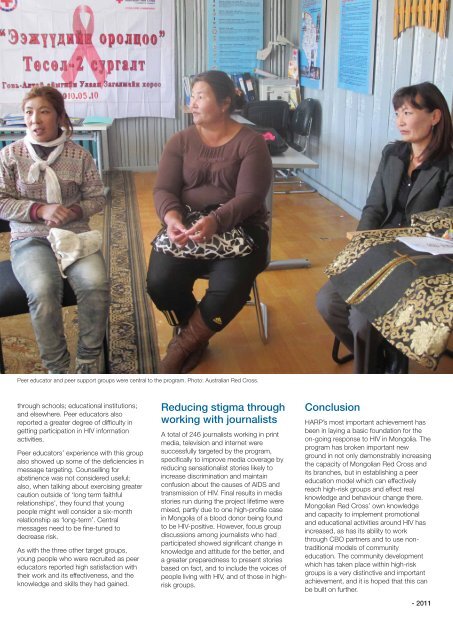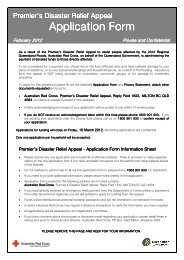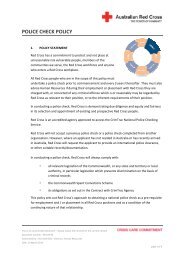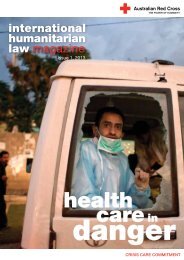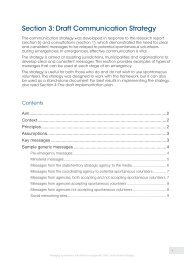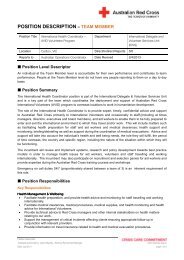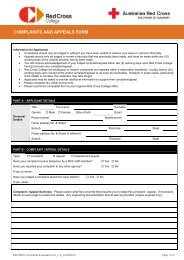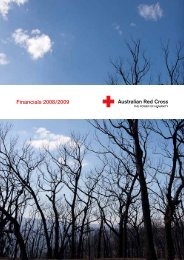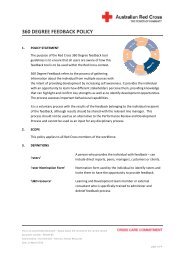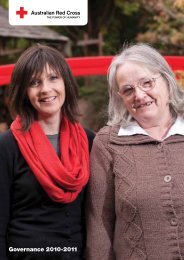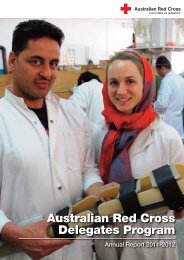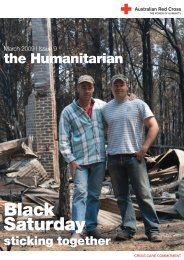HIV and AIDS response program, Mongolia - Australian Red Cross
HIV and AIDS response program, Mongolia - Australian Red Cross
HIV and AIDS response program, Mongolia - Australian Red Cross
- No tags were found...
Create successful ePaper yourself
Turn your PDF publications into a flip-book with our unique Google optimized e-Paper software.
Peer educator <strong>and</strong> peer support groups were central to the <strong>program</strong>. Photo: <strong>Australian</strong> <strong>Red</strong> <strong>Cross</strong>.through schools; educational institutions;<strong>and</strong> elsewhere. Peer educators alsoreported a greater degree of difficulty ingetting participation in <strong>HIV</strong> informationactivities.Peer educators’ experience with this groupalso showed up some of the deficiencies inmessage targeting. Counselling forabstinence was not considered useful;also, when talking about exercising greatercaution outside of ‘long term faithfulrelationships’, they found that youngpeople might well consider a six-monthrelationship as ‘long-term’. Centralmessages need to be fine-tuned todecrease risk.As with the three other target groups,young people who were recruited as peereducators reported high satisfaction withtheir work <strong>and</strong> its effectiveness, <strong>and</strong> theknowledge <strong>and</strong> skills they had gained.<strong>Red</strong>ucing stigma throughworking with journalistsA total of 246 journalists working in printmedia, television <strong>and</strong> internet weresuccessfully targeted by the <strong>program</strong>,specifically to improve media coverage byreducing sensationalist stories likely toincrease discrimination <strong>and</strong> maintainconfusion about the causes of <strong>AIDS</strong> <strong>and</strong>transmission of <strong>HIV</strong>. Final results in mediastories run during the project lifetime weremixed, partly due to one high-profile casein <strong>Mongolia</strong> of a blood donor being foundto be <strong>HIV</strong>-positive. However, focus groupdiscussions among journalists who hadparticipated showed significant change inknowledge <strong>and</strong> attitude for the better, <strong>and</strong>a greater preparedness to present storiesbased on fact, <strong>and</strong> to include the voices ofpeople living with <strong>HIV</strong>, <strong>and</strong> of those in highriskgroups.ConclusionHARP’s most important achievement hasbeen in laying a basic foundation for theon-going <strong>response</strong> to <strong>HIV</strong> in <strong>Mongolia</strong>. The<strong>program</strong> has broken important newground in not only demonstrably increasingthe capacity of <strong>Mongolia</strong>n <strong>Red</strong> <strong>Cross</strong> <strong>and</strong>its branches, but in establishing a peereducation model which can effectivelyreach high-risk groups <strong>and</strong> effect realknowledge <strong>and</strong> behaviour change there.<strong>Mongolia</strong>n <strong>Red</strong> <strong>Cross</strong>’ own knowledge<strong>and</strong> capacity to implement promotional<strong>and</strong> educational activities around <strong>HIV</strong> hasincreased, as has its ability to workthrough CBO partners <strong>and</strong> to use nontraditionalmodels of communityeducation. The community developmentwhich has taken place within high-riskgroups is a very distinctive <strong>and</strong> importantachievement, <strong>and</strong> it is hoped that this canbe built on further.- 2011


